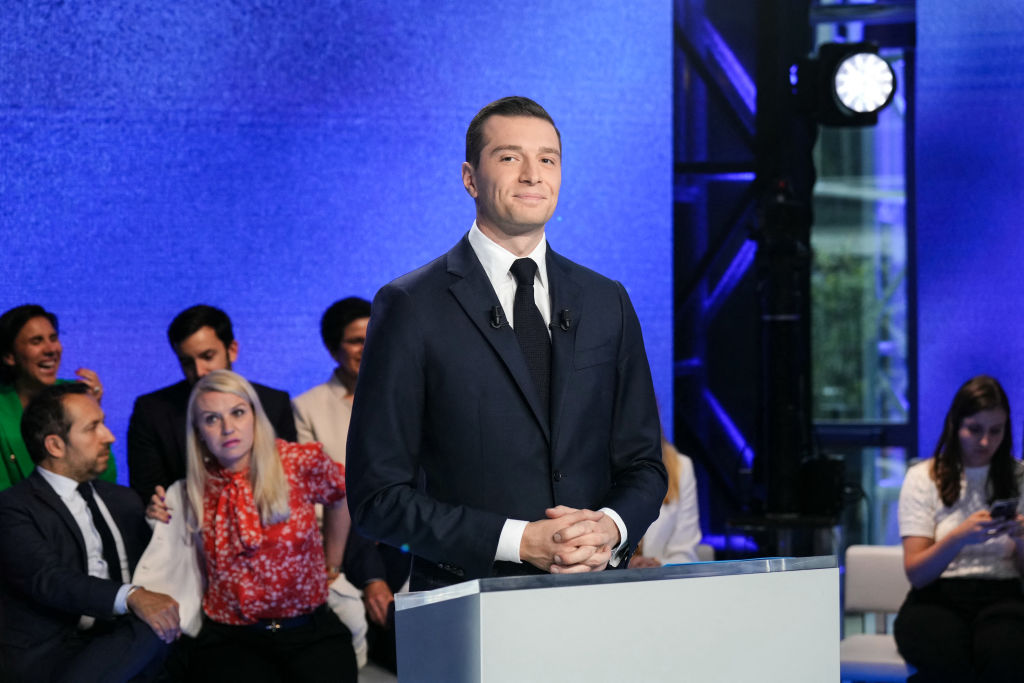For a populist hoping to revolutionise France with a radical new agenda, Jordan Bardella at first sounded more like a utilities salesman than a future prime minister. Pointing to an image of an electricity bill during last night’s televised debate, the President of the National Rally (RN), said his most pressing ambition was to make fellow citizens feel comfortable with their service-providers.
“Today, opening your bills or opening your mail is a source of anxiety for millions of French people who, in our country, are no longer able to make a living from their work,” said Bardella. “If the French place their trust in me, I will be the prime minister of purchasing power.”
Bardella is only 28, and has zero governing experience, but was determined to stake his claim to being a serious politician and move away from the caricature of a far-Right rabble-rouser obsessed with immigration and identity. As well as current PM and Emmanuel Macron ally Gabriel Attal, he faced off last night against Manuel Bompard of the New Popular Front, an alliance of Leftist parties that hopes to lock the RN out of power.
The trio used their appearance on TF1 to try and convince voters to support them in snap two-round parliamentary elections called by Macron, which are due to open on Sunday.
Attal targeted Bardella’s inexperience by attacking “financial pit” ideas, which include dropping VAT on energy products from 20% to 5.5%, ensuring some €17 billion being wiped off state coffers. There was also intense criticism of the spendthrift Leftist coalition for making reform suggestions that would cost billions, without any indication of how the money would be raised.
Unsurprisingly, Bardella was more confident when it came to immigration. A sulphurous issue in this election is droit du sol — the right to French citizenship for anyone born in France, whatever the nationality of their parents. Bardella wants to abolish it, saying it “no longer makes sense in a world of eight billion people”. He described “continents, and in particular Africa, which will become demographic bombs and where we know that a large part of those aspiring to immigration will be tempted to come to European soil”. He insisted that “immigration is a major subject that disrupts our identity, our security and the balance of public accounts”.
A Bardella government would mean “drastically reducing migratory flows” and passing “an emergency law to abolish” droit du sol. “It will be done calmly, by law,” said the RN President, even though the Constitutional Council — France’s highest court — has already ruled against such measures, as recently as January.
Bardella then focused on dual nationals, whom he wants banned from all security-sensitive public roles. “You want to put a Franco-Russian at the head of a nuclear power plant?” he asked.
Attal immediately retorted: “Can you tell the French watching us who Tamara Volokhova is, yes or no?” Volokhova is the RN’s advisor to the Identity and Democracy group in the European Parliament, of which the party is a member. She is, as Attal pointed out last night, herself a Franco-Russian who represents the RN at the Foreign Affairs Committee on security and defence issues — and who in the process attends closed-door meetings which cover confidential information on the Ukraine war.
Bardella was stuck for a reply, leading Attal to claim that “there are 3.5 million French people who are stigmatised by your proposal.” It might have been an embarrassing putdown, but it’s unlikely to sway voting intentions. The RN is flying high in opinion polls at around 35%, with the New Popular Front on a little under 30%, and Macron’s coalition headed by his Renaissance party on around 20%.
The overriding choice in the parliamentary elections is between putting trust in Bardella’s party or blocking it. This is why Macron has been warning of “civil war” if an overwhelming majority really does opt for the extremes, including by backing the New Popular Front. Issues such as energy bills are of course crucial to any election, but in this case the stakes are far higher.











Join the discussion
Join like minded readers that support our journalism by becoming a paid subscriber
To join the discussion in the comments, become a paid subscriber.
Join like minded readers that support our journalism, read unlimited articles and enjoy other subscriber-only benefits.
Subscribe